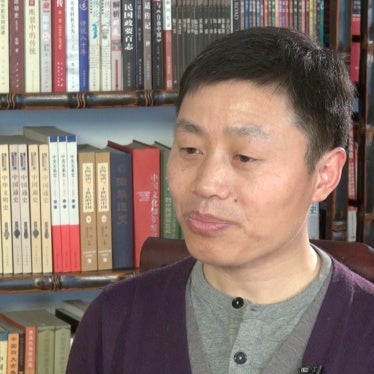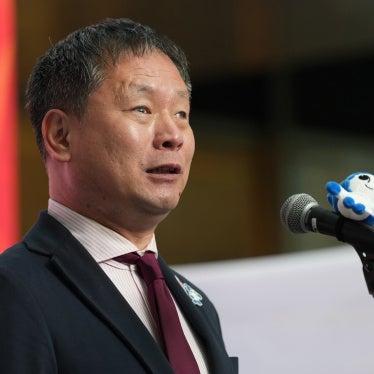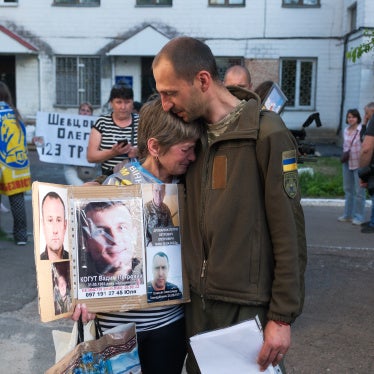Commonwealth Heads of Government
Re: CHOGM Meeting in Sri Lanka
Dear Commonwealth Heads of Government,
Human Rights Watch wrote to you in February expressing our grave concerns about the Commonwealth’s decision to press forward with the holding of the Commonwealth Heads of Government Meeting (CHOGM) in Sri Lanka in November 2013. I am writing now to reiterate those concerns, particularly in light of developments at the United Nations Human Rights Council in March and the visit to Sri Lanka of the UN High Commissioner for Human Rights Navi Pillay in August. Unless Sri Lanka makes prompt, measurable, and meaningful progress on human rights issues, we urge that you take a public decision not to attend the 2013 summit or, at a minimum, send a low-level delegation to make your concerns clear to the Sri Lankan authorities.
Since the end of the country’s civil armed conflict in May 2009, the human rights record under the administration of President Mahinda Rajapaksa has been abysmal. Indeed, Commonwealth concerns about human rights violations perpetrated by Sri Lankan government forces during the fighting prompted Commonwealth leaders in 2009 to defer a decision on Sri Lanka’s candidacy to host the summit. Despite the lack of progress since then, Commonwealth leaders in 2011 agreed to allow Sri Lanka to host the 2013 summit.
Since then, impunity for past abuses has continued and democratic space in the country has been severely narrowed. Despite credible allegations by both the UN Secretary-General’s Panel of Experts and the government’s own Lessons Learnt and Reconciliation Commission (LLRC) of numerous violations of the laws of war during the conflict, the government has undertaken no serious investigations or prosecutions. The government’s failure to prosecute wartime abuses is of particular concern to Human Rights Watch, as it not only allows the perpetrators of horrific crimes to go free, but it forever denies justice to the victims of abuses on both sides.
Because of the Sri Lankan government’s unwillingness to address these concerns, the Human Rights Council adopted a resolution in March that called on Sri Lanka to implement the many recommendations made by the LLRC. Since then, Sri Lanka has made many pronouncements about progress towards implementation, but as Pillay’s statement at the end of her mission makes clear, the reality is that the fundamental problems of impunity, unresolved enforced disappearances, and decreasing fundamental freedoms, among many others, remain.
An Abysmal Human Rights Record
During her visit to Sri Lanka in August, Pillay held extensive meetings with residents in the former conflict areas of the north and east of the country, as well as with government officials, politicians, and activists. In her statement, Pillay acknowledged that there had been considerable progress in reconstruction, resettlement, and rehabilitation work in the war-afflicted areas. However, she made it very clear that there continued to be persistent human rights violations, and that many of the recommendations from the LLRC adopted at the Human Rights Council’s March session had not been implemented. Chief among the concerns she expressed were:
- The need for credible investigations into allegations of war crimes, crimes against humanity, and other violations throughout the conflict, and not just the end phase, including the murders of 5 youths in Trincomalee and of 17 aid workers in Muttur in 2006;
- The failure to investigate or resolve thousands of outstanding enforced disappearance cases, leaving families without answers about what happened to their loved ones; lack of transparency about the army courts of inquiry set up to look into allegations of laws-of-war violations, and the need for credible independent investigations;
- Harassment and intimidation of human rights defenders, including persons who met with Pillay during her visit;
- The need to restore the independence of bodies such as the Elections Commission, the National Human Rights Commission, and the Police Commission;
- The need for a clear separation of the police from the Ministry of Defence, as the new Law and Order Ministry set up to supervise the police is headed by the president, who is also the minister of defence.
- Interference with the independence of the judiciary, highlighted by the impeachment of the previous chief justice, Shirani Bandarnaike;
- Extensive militarization in the north and east, with the military encroaching on civilian matters such as education, agriculture, and tourism;
- Military acquisition of private land to build permanent army camps, creating an environment that gives rise to abuses and is seen by the local population as oppressive and intrusive;
- Intense vulnerability of women and girls, particularly in female headed households, to sexual harassment and abuse.
Pillay also expressed deep concern at signs that Sri Lanka was turning into an increasingly authoritarian state. Critics of the government, including opposition politicians, journalists, and members of civil society routinely face harassment, intimidation, and threats. When Defence Secretary Gotabaya Rajapaksa, the president’s brother, threatened the editor of the Sunday Leader, she sought asylum abroad, a fate that has befallen many others who have criticized the government. President Rajapaksa has appointed his brother and other members of his family to powerful posts, raising concerns that he is trying to create a family dynasty. In 2010, he engineered the abolition of presidential term limits.
When concerns have been raised about Sri Lanka as an inappropriate venue for CHOGM, many Commonwealth countries have chosen to ignore the question, with only Canada announcing that Prime Minister Harper would not be attending. Australia has confirmed that its prime minister will attend, as has the United Kingdom, although the United Kingdom does admit to concerns about Sri Lanka’s rights record, including after Pillay’s visit. Despite previous expressions of concern, the Indian government has remained largely silent on the matter, with no clear commitment as to either attendance or the level of attendance for the summit. Few other Commonwealth countries have indicated whether they will attend.
The Failure to Implement “Commonwealth Values”
The Commonwealth Secretariat has largely refused to discuss the human rights situation at the meeting venue. Secretary-General Kamalesh Sharma has stated that the Commonwealth is active in promoting Commonwealth values in Sri Lanka, such as respect for human rights and free speech, and also in helping implement the LLRC recommendations.
Ahead of a Commonwealth Ministerial Action Group (CMAG), Secretary-General Sharma commissioned two independent legal reports on the impeachment of Sri Lanka’s previous chief justice, Shirani Bandarnaike. In spite of calls by the Canadian government and others to make those reports available to CMAG during its April meeting Sharma chose not to release the reports even to CMAG members. At least one of those two opinions, leaked on September 8, states that the impeachment of the chief justice was unconstitutional and was a “direct violation” of the rule of law and contravened Commonwealth Values and Principles.
Human Rights Watch believes that holding the summit in Sri Lanka cast serious doubts on the Commonwealth’s commitment to supporting human rights, democratic reform, and fundamental human rights enshrined in the Commonwealth Harare Declaration of 1991. It is likely to prove to be a major embarrassment to the Commonwealth and its participants, particularly given Pillay’s findings that little progress has been made on key issues since 2009. Even now, intimidation and harassment of those who met with her was reportedly ongoing.To allow Sri Lanka to host the 2013 summit in the aftermath of the scathing report by the UN’s rights chief would be to reward an abusive government and a public disavowal of Pillay’s findings.
Recommendations
In our previous letter to you, we included benchmarks that we believe need to be met before Sri Lanka is permitted to host CHOGM. These benchmarks include:
- Ensuring meaningful domestic implementation of the international human rights treaties to which the government of Sri Lanka is party, and bringing all legislation into line with international human rights standards;
- Providing guarantees that all Sri Lankan people will be treated with dignity and respect as equal citizens, and live in an environment in which they can enjoy all fundamental rights guaranteed by the Constitution of Sri Lanka, including:
a. Restoring constitutional provisions that guarantee separation of powers and reinstating the independence of the three branches of government;
b. Restoring the independence of key government institutions, such as the National Human Rights Commission;
c. Instituting effective mechanisms to protect journalists, civil society groups, and human rights defenders who work for the promotion and protection of human rights;
d. Supporting and cooperating with independent and credible domestic and international investigations into all allegations concerning violations of international humanitarian and human rights law in the country, especially related to the conduct of the conflict which ended in 2009; and
e. Committing to collaborate with the Office of the UN Secretary-General to initiate the implementation of the recommendations set out in the report of the Secretary-General’s Panel of Experts.
With the summit only two months away, and with scant evidence of any of these benchmarks having been met, even nominally, we call on you to decide not to attend CHOGM or send only a low-level delegation to the summit.
Thank you for your consideration.
Sincerely yours,
Brad Adams
Asia Director







